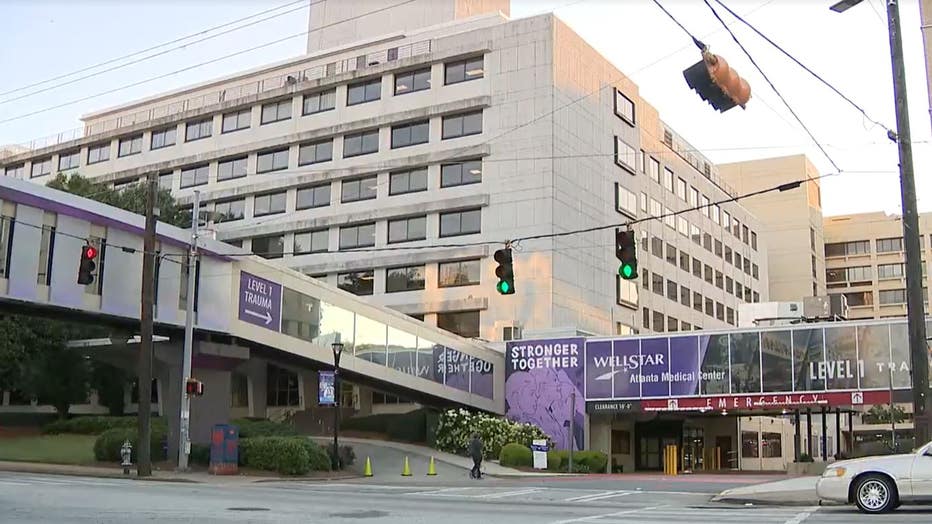Closure of Wellstar Atlanta Medical puts pressure on area emergency departments
AMC closures has ripple effect on Atlanta's ER care
The closure of Wellstar Atlanta Medical Center has had a big impact on emergency care in our area. Many hospitals report longer emergency department wait times.
ATLANTA - When the news broke Wellstar Atlanta Medical Center was closing, Emory University Midtown Hospital emergency physician Dr. Nataisia Terry remembers feeling shocked, and knowing thousands of patients would soon be losing their emergency care.
"I think my second thought was, ‘Well, how do we mitigate that, and what do we do next,’" Dr. Terry says. "Because we understand that we are going to get a good portion of those patients."
Emory Midtown is just over a mile from the AMC campus, the closest hospital, and, today the most impacted by the closure.
The hospital’s chief quality officer, Dr. Nicole Franks, says their emergency visits are up about 30% from last summer, jumping about 170 patients a day to 220, an increase of about 50 patients a day.
"What we immediately felt was volumes (increasing) in the emergency department," Dr. Franks says. "Ambulance traffic certainly has increased approximately 54%, and that’s just really in about the first 6 months since they closed. We are continuing to manage that volume and adjust, but it has been a challenge."
Like many emergency departments across the US, Emory Midtown struggles with the issue of patient boarding.
The hospital’s inpatient beds are frequently at staffing capacity, leaving an average of 20 to 30 patients who need to be admitted but are waiting in the ED for an inpatient bed to open up.
"So we are seeing about a 42% increase in emergency department length of stay for our patients who are admitted," Dr. Terry says.
PATIENTS STILL SEARCHING FOR NEW DOCTORS NEARLY 1 YEAR AFTER WELLSTAR ATLANTA MEDICAL CENTER CLOSES
To try to speed up the flow of patients in the ER, Emory Midtown has created a special zone for patients waiting for a bed, and the hospital has opened 2 mobile ED units less acute patients who are likely to be treated and discharged.
"I think the biggest challenge really is just trying to make sure that we’re providing timely care to a patient population that’s been orphaned, essentially, and bringing them into the Emory medical home," Dr. Terry says.
About 18 miles away in South DeKalb County, Emory Hillandale Hospital’s emergency department is under construction, the waiting area boarded up.
Mike Steele is Emory Hillandale’s specialty director of emergency services
"We don’t ever know what’s coming in," Steele says. "So, it could be somebody coming in with respiratory distress or a heart attack or it could be somebody that has run out of their medications and can get into their PCP, or their primary care."

Wellstar Atlanta Medical Center Downtown in Atlanta (FOX 5).
Nearly 10 months after Wellstar AMC’s closure, ER visits here at the community hospital are up about 10%.
"So, what that looks like is like another 10 to 12 to 13 patients a day for us," Steele says. "In our ER itself, we have 25 beds for the care of the most acutely ill patients."
But with $12 million in critical funding from DeKalb County, Emory Hillandale is expanding its emergency waiting area and adding 10 to 15 new treatment rooms.
"We just got so busy and, you know, just too many patients, too few rooms," Steele says. "So, having 5 or 10 extra beds like we’re getting now, it’s going to be a game changer for sure."
The DeKalb County funding has also helped the hospital buy a new CT scanner, and expand its intensive care unit on the second floor.
Emory Hillandale’s chief nursing officer Edna Briscoe says the expansion will take them from 8 ICU beds to 15, allowing more acutely ill patients to stay closer to home.
"We’ll be able to move both of our ICUs into one space, which will allow us to be more efficient with our patient care and our staffing," Briscoe says.
Back at Emory Midtown, Dr. Terry says her team is pivoting and pushing forward.
"I’m really proud of our team and how we as a community at large have come together to really bring these patients in and make sure that they are receiving appropriate, timely care," Terry says.

